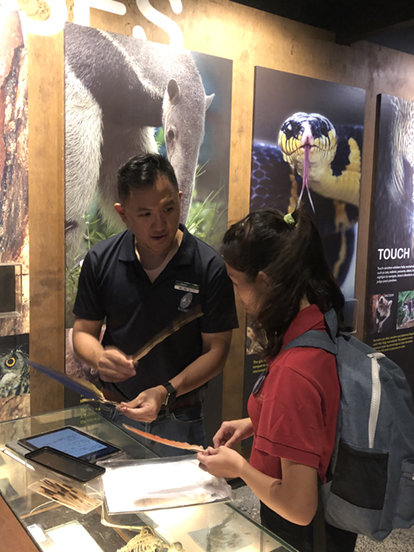Weiren Loh, Programme Manager at the NUS Overseas Colleges, has always loved animals, having spent much of his childhood growing up with his grandparent’s menagerie of Pomeranians, Shih Tzus, German Schnauzers and Maltese. That was also the time, however, when Weiren discovered he had an allergy to animal fur.
Growing up, his desire for a house pet did not subside but neither was it fulfilled. The next best option was to take up biology and study animals from a hands-off approach. During his first year as a biology undergraduate in NUS, Weiren seized the opportunity to be a volunteer with Wildlife Reserves Singapore (WRS) after attending their recruitment drive on campus. He started out as a student/junior volunteer before moving on to the adult volunteer group by the time he graduated from NUS.
Being with the adult volunteer group (also known as docents) was much more challenging than he could imagined. The training became more intensive and in-depth, with twice-weekly classes for six consecutive weeks. Besides learning the technical terms, little-known facts and anecdotes on the animals, Weiren had to manage projects and undergo on-the-job training. The course ended with a closed book written test on animal know-hows and their scientific names. “Spelling many of these names was no easy feat”, he recalled. “The test was harder than some of my biology papers!”
Docents can work with different animal collections during specific times of the year, and Weiren has worked with a number of animals such as snakes, leopards, rhinoceroses, giraffes, zebras, tapirs, elephants and pygmy hippos. However, on most days, Weiren would also find ways to engage with visitors about wildlife conservation through animal specimens and exhibits as well as interesting information that he has gathered over the years, both at the Night Safari and at WRS’ roadshows at venues such as the Istana.

Drawing on his 10 years’ experience as a volunteer, Weiren has now taken on the role of a head trainer for volunteers and station masters. He is enhancing his training programme to look at animals through the lens of conservation theories he had picked up during his time at NUS.
Weiren encourages those who have an affinity for animals to sign up as volunteers. “Volunteering is an avenue for you to learn something new, pick up different skills and meet people you wouldn’t have met otherwise,” he said. “You would also learn more about animal conservation and play an important role in spreading the message to others”.
“I always see volunteering as a way to do something different from my work and live my other passions. I treat it as a retreat for myself.”